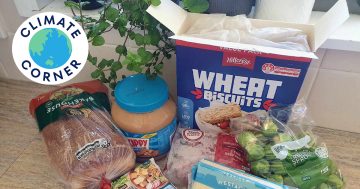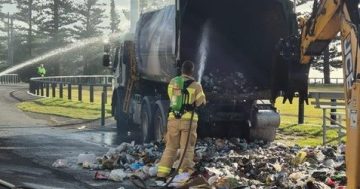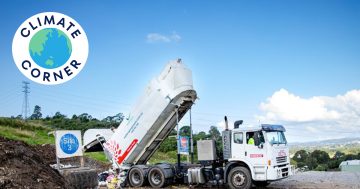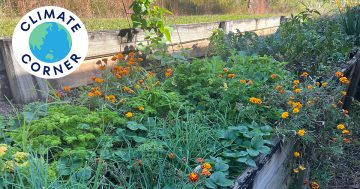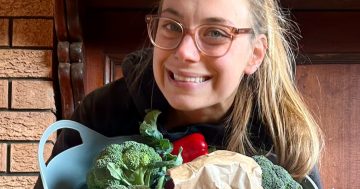
We dug around in the yellow bin to get the dirt on recycling. Photo: Zoe Cartwright.
Have you heard recycling is a scam – that you might as well chuck any old thing in the yellow bin because it all goes to landfill anyway?
We know regular readers of Climate Corner want to do their best for the planet and recycling is key to that. It’s even one of the three Rs: reduce, reuse, recycle.
Fun fact – there are actually five Rs now: refuse, reduce, reuse, repair and recycle. And they are listed in order of importance.
Region Illawarra got our hands dirty and did some digging into what happens to the contents of your yellow bin after it’s picked up – and the news is actually pretty good.
Visy, the largest processor of kerbside recycling in Australia and largest integrated business linking recycling and remanufacturing, handles recycling in the Illawarra region.
It manufactures everything from cardboard boxes and jam jars to wine bottles and water bottles, all using recycled content.
Each year, Visy collects and processes about two million tonnes of recyclables from about 3.8 million households and 13,000 commercial and industrial customer sites.
It operates 26 facilities across NSW alone, including the largest recycling facility in the southern hemisphere in Smithfield in Western Sydney, and employs more than 1600 staff in the state across its operations.
Once a recycle bin is picked up, it gets sorted at one of Visy’s recycling facilities.
A Visy spokesperson describes the process.
The facilities are surprisingly high-tech with infra-red scanners to identify the make-up of packaging, optical sorters and magnets to extract metal.
Plastic is shredded and bathed in water to be sorted – different types of plastic will sink or float.
There are also staff watching the line to pull out anything that shouldn’t be there.
Once sorted, paper and cardboard are sent to one of Visy’s paper mills in Smithfield or Tumut to be remade into recycled paper reels.
Glass goes to Visy’s recycling plant in Penrith where it is sorted by colour ready for remanufacturing into new glass bottles and jars.
Aluminium and steel are sent to a specialist company for processing.
Plastics are sorted – PET (e.g. water bottles) and HDPE plastic (e.g. milk bottles) are used to remake new packaging products.
The remaining plastic is sent to third-party Australian manufacturers and made into resin pellets ready for manufacturing.
It all sounds too good to be true – so Region Illawarra spoke to Liam Taylor from Planet Ark.
If anything, he said Visy was underselling its success.
“Between 88 and 94 per cent of what goes into yellow bins in Australia is recycled,” he said.
“The remaining percentage isn’t recycled either because of contamination or because it shouldn’t be there in the first place.
“Australia has three main sectors for waste, household, construction and demolition, which has an even higher rate of recycling than households, then commercial an industrial waste. That last one is more difficult, but overall we recycle about 60 per cent of all the waste we generate.”
So where do the rumours of phantom recycling factories come from?
Liam said there were a couple of reasons.
The first is the disruption to Australian recycling when China stopped accepting it in 2017.
The other is that sometimes operators are doing the wrong thing – and when they’re caught, there’s a lot of publicity.
“It’s a very small percentage of the industry. But it does happen, and it gets a lot of attention,” he said.
“The China Sword policy also got a lot of attention when it came in in 2017. But since then we’ve seen significant investment in our domestic recycling industry and new policies.
“For example, you can’t just send unprocessed recycling offshore anymore, it has to be clean and shredded at minimum.”
There are a few ways you can help make sure 100 per cent of your yellow bin’s contents gets recycled.
First, don’t “wish cycle”. Even if you feel something should be recyclable, it can’t if it’s not a glass bottle, aluminium can, plastic identified with an Australian Recycling Number, paper or cardboard.
This means broken household glass materials, tetra packs and soft plastics are strictly out.
Next, give containers with food residue a quick rinse or chuck them through the dishwasher before you bin them.
Don’t be tempted to save space by filling closed cardboard boxes with other stuff – they’ll be taken off the line because processors can’t know what’s hidden inside them. Break boxes down instead.
Leave caps and jar lids screwed on. They’re small and can get lost in the mix if they’re floating about, and Visy has processes to separate them once they’re in the sorting factory.
If it sounds like a bit of work, you can minimise it by following some of the other Rs.
“The best thing you can do is refuse or reduce unnecessary items and packing, and avoid producing waste in the first place,” Liam said.
“Then try to include more reusable items like water bottles and keep cups. Repairing things like clothes with a small hole or a cracked phone screen is much better than recycling them and buying new.
“If none of these options are available, then it’s time to recycle.”
Liam said there were plenty of specialised schemes – for everything from mobile phones to mattresses – for recycling superstars disheartened by the number of things that couldn’t go in the yellow bin.
Head to Planet Ark – Planet Ark Recycling Near You and pop in your postcode to find out what you can recycle and where.









